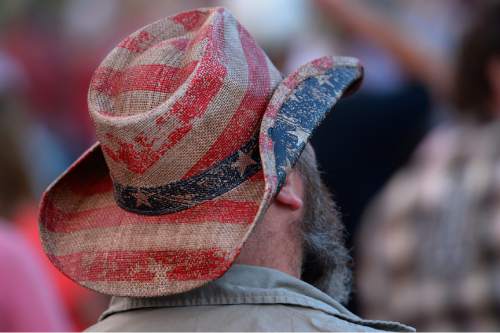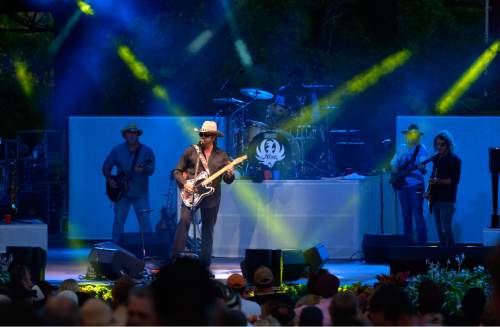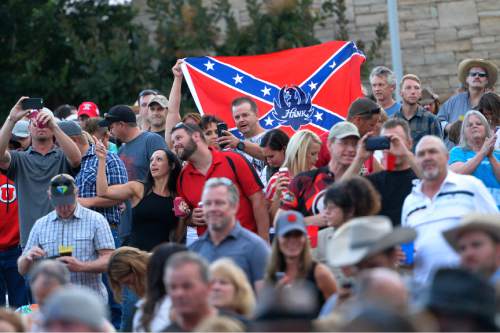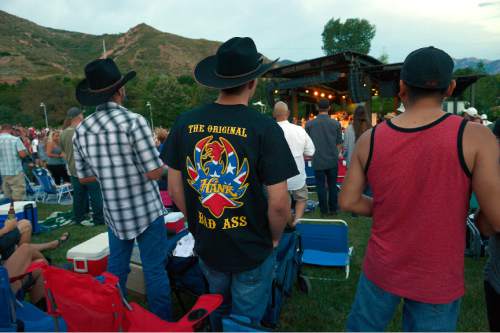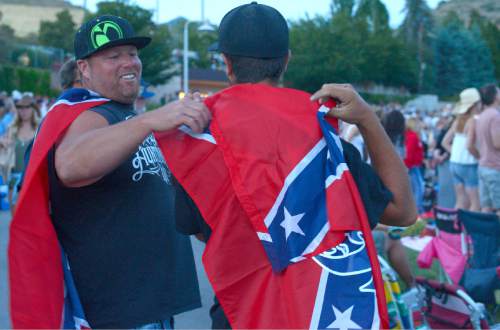This is an archived article that was published on sltrib.com in 2015, and information in the article may be outdated. It is provided only for personal research purposes and may not be reprinted.
It's a fine line between sensitivity and censorship.
Red Butte Garden hopes to find a reasonable balance.
Controversial acts and merchandise may no longer be welcome at the upscale concert venue tucked in the Wasatch foothills, its director said Friday — fallout from a wave of Confederate flag merchandise that rankled some attendees of Tuesday's Hank Williams Jr. show.
"I think it's safe to say that we probably wouldn't have booked this act," said Red Butte's executive director, Greg Lee, "if we had known everything that we now know."
But barring prickly performers and saying no to merchandise with a contentious message, is dangerous to free speech, say First Amendment experts, and would threaten the exchange of ideas on a piece of public property owned by the University of Utah. The garden, with views of young blooms and the Salt Lake Valley, is part of campus.
Private venues, such as EnergySolutions Arena, have more leeway than Utah's state arboretum.
Even so, "we've said no to acts before," said Lee, who declined to name specific performers.
On Tuesday, concessionaires rejected Lee's request that they stop selling the flags. Under the booking contracts, vendors choose what to sell and the venue may refuse concessions only if they're illegal.
"Just because something's legal doesn't mean it's the most sensitive thing to do or the right thing to do," said John Ferguson, business ethics professor at Utah State University and former attorney for the First Amendment Center associated with Nashville's Vanderbilt University.
But heightened sensitivity could come at a hefty price, Ferguson said.
"I think they're going to have a lot of problems if they try to limit controversial acts," he added, noting that the same goes for blocking certain items for sale.
"Limiting that speech based solely on the fact they don't like that speech" would likely invite a legal challenge from the American Civil Liberties Union, Ferguson said.
Still, Lee wants an emergency stop. He is pursuing a legal route against merchandise that is "divisive in a destructive way."
"I'm not looking forward to ever having to invoke that," Lee said, "but I think there's certain cases where we need to have that ability." He has exchanged emails with U. attorneys but has had no formal talks.
The university's lawyers could not be reached by phone Friday afternoon.
Earlier this week, some concertgoers and others were dismayed to see that Confederate flags were being sold by Williams Jr.'s concessionaires. The Stars and Bars, and its associations with racism and the South's history of slavery, has been the subject of national debate in the wake of the June 17 shooting at a historic black church in Charleston, S.C. The massacre — which killed nine worshipers and has been deemed a hate crime by the Department of Justice — spurred South Carolina state leaders to remove the Confederate flag from the Capitol.
Performance and politics often intersect, Lee acknowledged, but the pairing can pose a dilemma. For example, if a performer sold merchandise that took a side on the abortion debate, Red Butte could appear to endorse the position. Under current contracts, he said, it does not have power to reject that association.
The U.S. Supreme Court appeared to agree in a 5-4 ruling in June. The court sided with a Texas law prohibiting Confederate flags on license plates.
People might perceive the state was promoting the flag, the court decided, and the state is entitled to its own speech.
That outcome gives rise to Lee's idea, said U. law professor Randy Dryer, who spoke on his own behalf and not the university's.
The U., Dryer believes, could refuse the sale of merchandise "that will be interpreted and viewed by public as university's speech."
Twitter:@anniebknox


